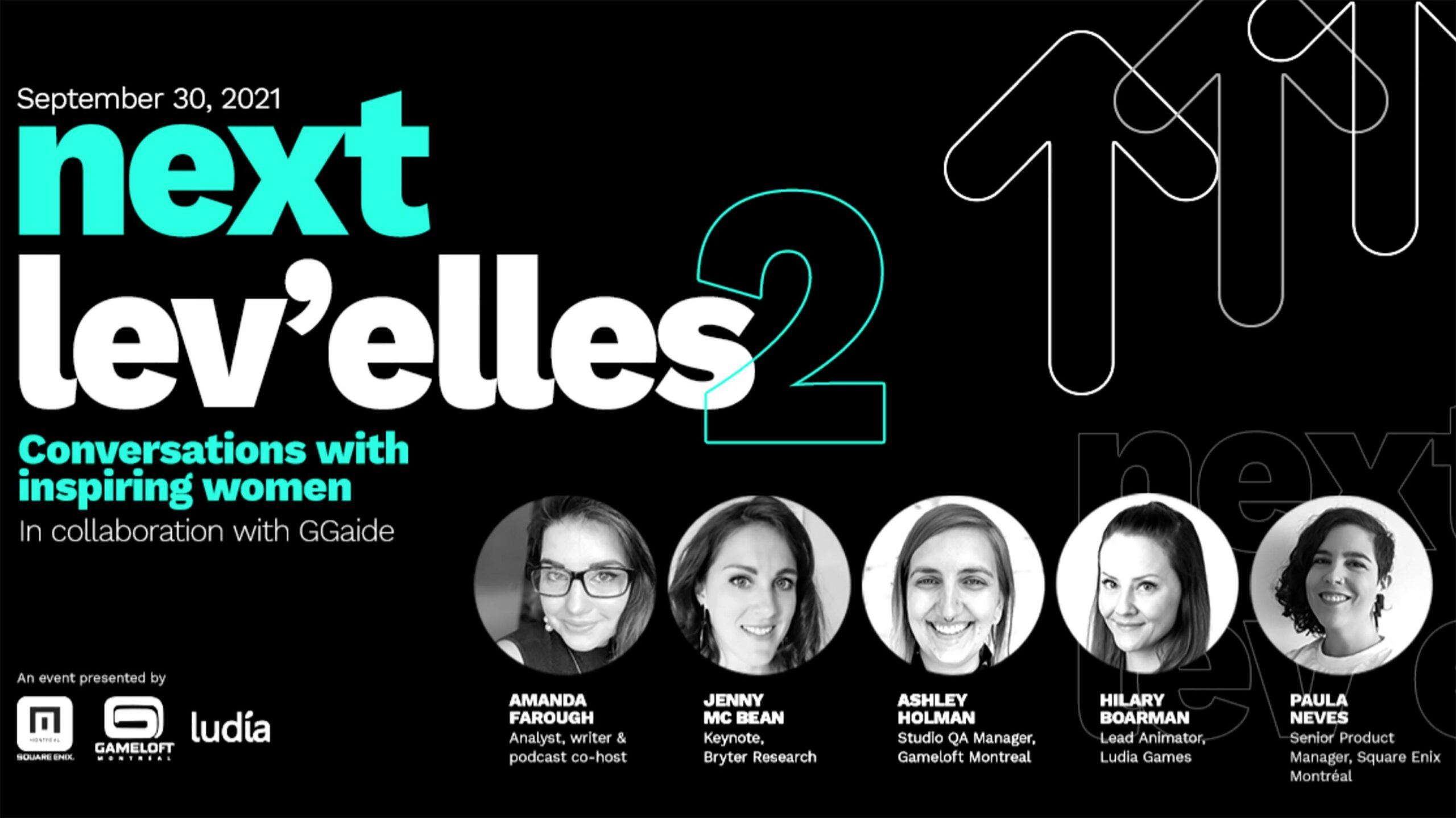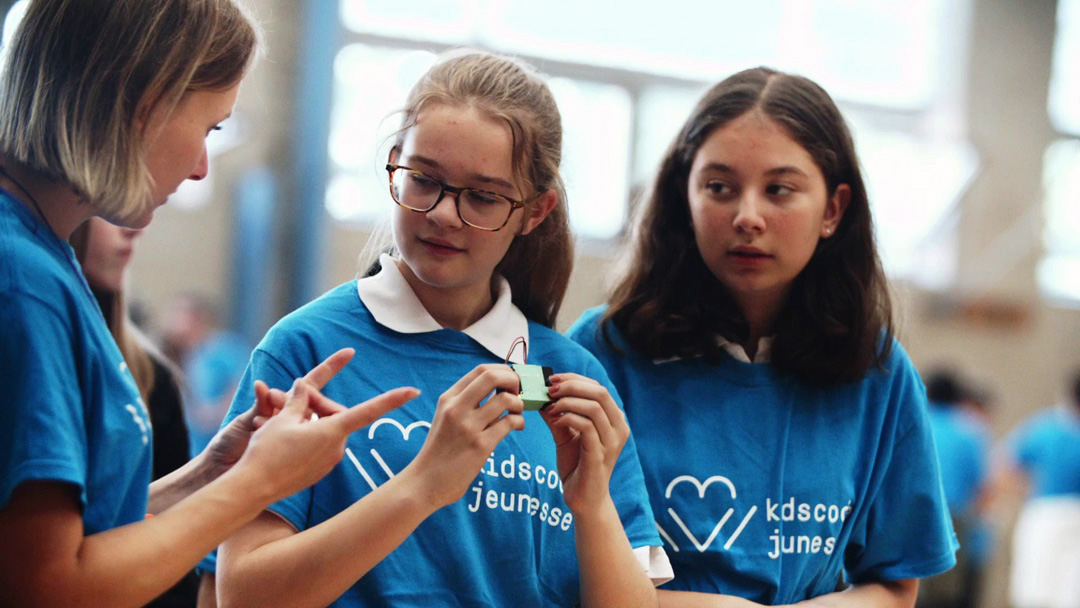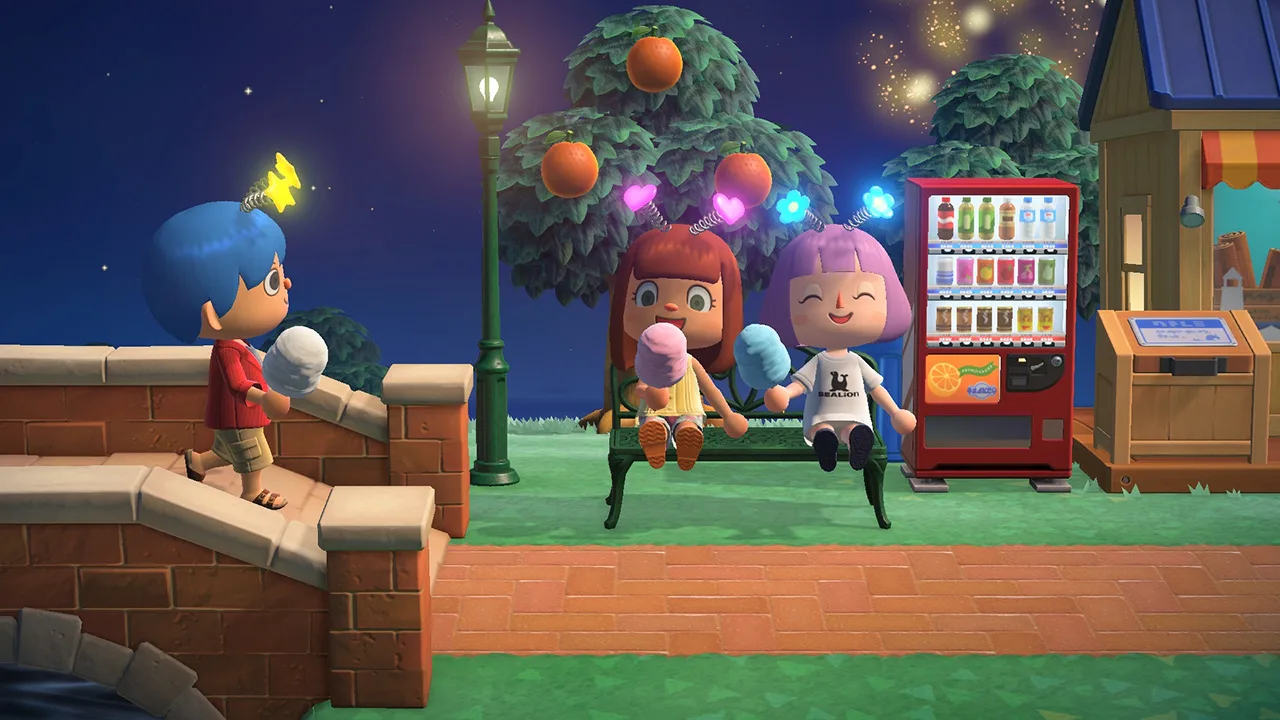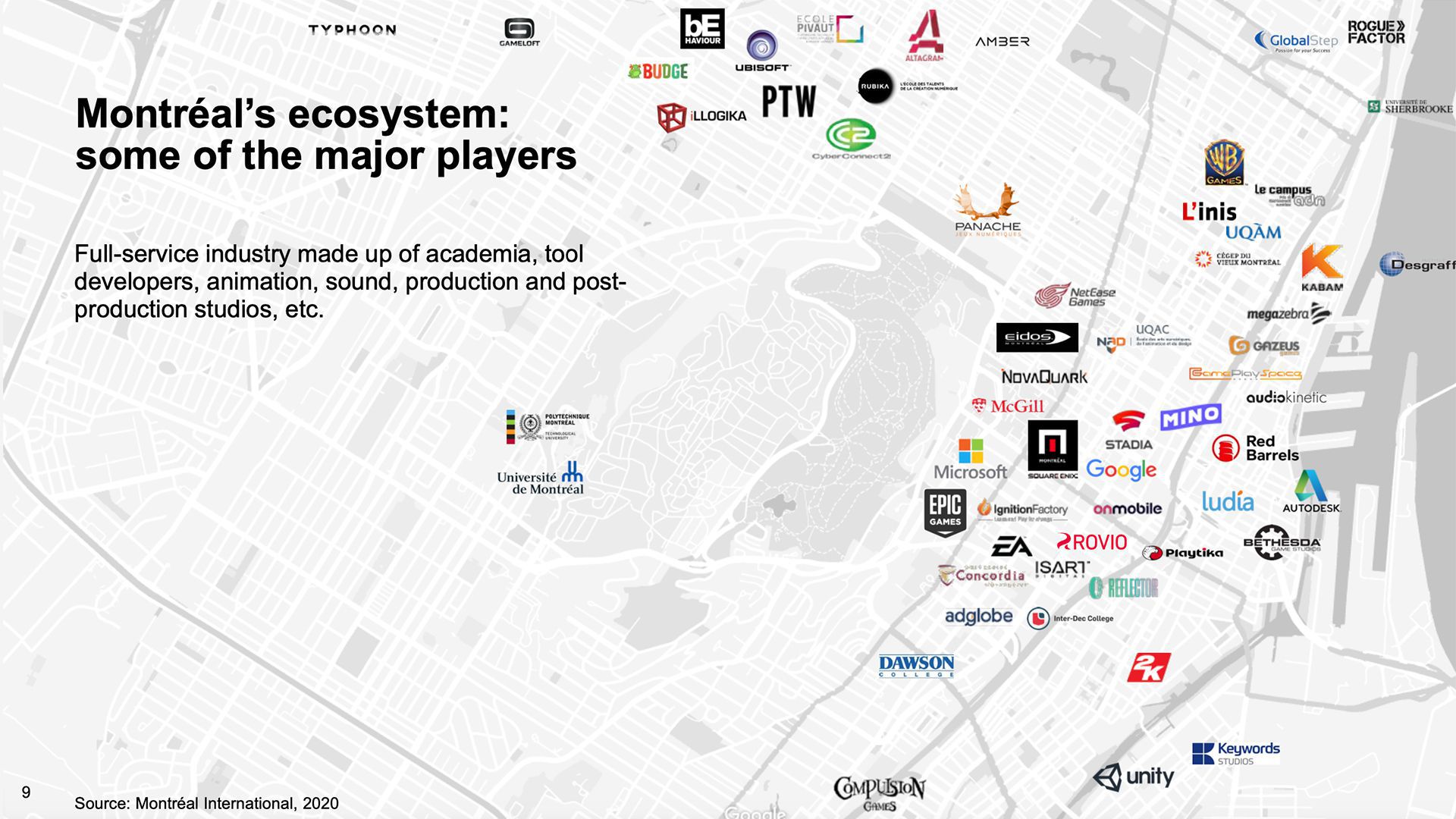
In Canada, there’s about a 50/50 split between men and women who play video games.
This figure is largely similar around the world, be it in the U.S., where 41 percent of gamers are women, or Asia, where 40 to 45 percent of the gaming population is female.
And yet, we don’t see that reflected in the people who actually make games. In a 2021 Game Developers Conference (GDC) survey of more than 3,000 game makers, only 21 percent of respondents identified as women.
The GGAide conference is proud to partner with Next Lev'Elles, an event created by @SquareEnixMontreal @LudiaGames and @GameloftMontreal to amplify women's voices in the video game industry. Book your ticket now! https://t.co/jZX232Kr5C pic.twitter.com/XenOwf6UiQ
— Techaide (@TechaideMTL) September 20, 2021
It’s an issue that three Montreal developers are actively working to combat with Next Lev’Elles, an initiative that aims to amplify the voices of women in the industry and encourage more women to join it.
Following its first event launched in March on International Women’s Day, a second Next Lev’Elles conference will be held on September 30th as part of GGAide’s Quebec games industry charity event. The 2021 GGAide Conference is raising money for Centraide of Greater Montreal and will feature guests from the likes of Ubisoft, Bethesda and EA.
Next Lev’Elles is a particular standout among the GGAide event’s lineup for being a cross-studio collaboration founded by Square Enix Montreal‘s Nedjma Belbahri, Gameloft Montreal‘s Geneviève Sorel, and Ludia‘s Junel Popp. Although they work at different companies, the three founders met at last year’s MEGAMIGS, a one-of-a-kind Montreal-based video game industry event, and quickly hit it off.
“We really wanted to showcase what’s going on in mobile gaming. Montreal is very well-known for its PC, console, AAA [games], but maybe not as much for its mobile successes,” explains Belbahri, Square Enix Montréal’s director of communications. “It was such a great collaboration, and there was never a question of competition between us.”
“We felt that we would have [many] more voices if we united and we start looking at issues in our industry…”
It’s that disinterest in pitting developers against one another that helped inspire and shape Next Lev’Elles.
“I think there’s so much competition in our industry that at some point, you have to kind of change the narrative on that,” says Sorel, director of communications at Gameloft Montreal. “It makes me think of all of the car dealerships, where they all go on the same street and at some point, they help each other in attracting [more people]. So we felt that we would have [many] more voices if we united and we start looking at issues in our industry, and how we can improve this and also support the industry with constructive discussion and support communities.”
Their inaugural March 2021 event proved more successful than they could have imagined. According to Sorel, they maintained “very low” expectations over how much they’d raise for women in gaming charities, estimating that they’d potentially bring in about $2,000. They ended up raising more than triple that amount: $7,000.
“It just showed us that we were going in the right direction and we had a full house — lots of great people around the world, not only in Canada,” says Sorel. “So the idea to continue this discussion was just very natural.”
Unpacking common misconceptions
One of the big focuses of the sophomore Next Lev’Elles event is to address misunderstandings about women in gaming. According to Belbahri, these exist “on both sides” — that is, among both the developers and the players.
“There are women not seeing themselves as gamers, right? ‘Oh, I don’t play or I’m not good.’ Our playtester team tells me this all the time — women will come in and say ‘Oh, you know, I’m not the best at this.’ And they’ll just blow everybody out of the water,” she explains. “So that perception still that women are not as much into games is true on both ends — of the developer side, from the marketing side, and from the users themselves.”
Belbahri says companies need to think about “continuous improvement and bringing in more diversity and more points of view” to help dispel these kinds of beliefs.
“…There’s a place for everyone.”
“I think a lot of people go, ‘okay, what’s your solution today?’ And I think that’s the wrong question to ask. I think we need to have a mid- to long-term vision of interesting people from more diverse backgrounds into our industry […] Because we can’t say ‘okay, in two years, it’s fixed.’ It’s impossible,” she says. “So I think events like ours [help] get the word out there and raise awareness and increase representation and show these amazing women who have great stories and who don’t all have career backgrounds in video games.”
To that point, Belbahri notes that there is a wide variety of jobs to be found in games, not just purely technical roles. “There’s that kind of barrier to entry that some men and women may have — ‘oh, you know, I don’t come from this sector.’ But there’s a place for such a range of talent, like audio and art, and that’s what we want to show by having a group of diverse women, from a product manager to an animator to a QA [quality assurance] lead. So not always showing that same perception of video games [equals] programmer. That’s not true — there’s a place for everyone.”
Indeed, what many people might not know is that a good number of the most influential figures in the gaming industry are women in all kinds of creative positions. This includes the likes of Roberta Williams (the creator of the adventure game genre), Kazuko Shibuya (Final Fantasy series artist); Mabel Addis (the first person to write a video game); Amy Hennig (the creator/writer/director of the Uncharted series); Yoko Shimomura (composer of Kingdom Hearts and Street Fighter) and Montreal’s own Jade Raymond (Assassin’s Creed co-creator and former head of Ubisoft, EA and Google studios). And those, of course, are just some of the most well-known examples.
All of that said, Belbahri, Popp and Sorel point out some challenges that are unique to the mobile space, particularly when it comes to public perception. Specifically, the mere announcement of a new smartphone game can be met with immediate disapproval, even if reception ends up being quite positive once players get their hands on it. Mobile games are often looked down upon, especially compared to console and PC titles, particularly due to the common ‘free-to-play with in-app purchases’ business model.
Nonetheless, mobile games continue to be popular, generating around $55 billion CAD in worldwide revenue in the first half of this year alone. And for their part, titles like Ludia’s Teenage Mutant Ninja Turtles: Legends, Square Enix Montreal’s Lara Croft Go and Gameloft’s Gangstar, as well as the likes of Niantic’s Pokémon Go, Mountains’ Florence and Mistwalker’s Fantasian are generally well-received among the sea of mobile titles released every week.
“[Making] mobile games is a great career, and the challenges are there, and the gameplay is now as sophisticated [as console/PC games]. AAA mobile is a thing that exists,” says Belbahri. “And so, between the amazing games that studios are putting out and the perception that [mobile games are] Candy Crush for your mom at the bus stop, we’re there [at the level of quality of AAA mobile games], we just need to bring the perception along with us.”
“It’s a societal shift, and we all have a role to play.”
Sorel says she believes the way to stand out in the field is for companies to put more time and care into mobile titles instead of pumping them out quickly with heavy monetization features.
“We’ll reach, at some point, a plateau where you’ve got to have a differentiation between good games and games that don’t really care about the players — they only care about making monetization out of that,” she says. “And players are becoming more and more educated about games, so they know what they want, and they know how they want it.”
“Consumers are expecting better games at a higher quality,” adds Popp. Achieving this, she notes, involves encouraging and hiring more people into the space.
Getting more women involved
One of the key ways the industry can improve the representation of women, say Belbahri, Sorel and Popp, is by “starting young.”
In other words, the goal is to get young girls interested in STEM (science, technology, engineering and mathematics) at a young age. But, the women say, there are proper ways to go about doing this.

Image credit: Kids Code Jeunesse
“All these initiatives targeting younger girls or other individuals shouldn’t have in mind, ‘oh, these are people we’re going to hire, ‘ABC,’ it’s a linear path. It’s [about] interesting them in STEM. It’s that fear of science,” says Belbahri.
“I think it was Barbie that had a doll that said, ‘math is hard.’ It’s not that long ago that you would go to a clothing store and the boys’ section would have NASA t-shirts, and the girls’ section would have princesses. It’s a societal shift, and we all have a role to play. How can we open their minds — their hearts, their eyes — to possibilities, so that at 12 years old, those possibilities are not just shut down by overall society and media messaging?”
To help with that, non-profits like Girls Make Games and the Montreal-based Kids Code Jeunesse actively work with educators, parents and government on STEM-related promotion among youth. Further, Belbahri, Sorel and Popp say it can be beneficial for representatives from studios like theirs to go to schools and demonstrate women in the industry to kids firsthand.
“Sending speakers and role models to different schools is what makes the difference at the end of the day,” adds Sorel. “We all get inspired at some point and it unlocks some doors, where you think like ‘oh, I never thought about that because of such and such,’ or [you were] assuming stuff. And you meet people that have a very different background that went [into games] and they’re super happy they have a fulfilled life, then you get this ‘lightbulb’ [moment].”
“And that’s what we’re trying to do: break down those barriers [and say] ‘hey, you can do all of this here — you do have this space here.”
As Popp notes, many key roles in the video games industry build on general hobbies that kids already enjoy on a regular basis.
“I think that is the misconception about video games — we’re seen as this weird, black box where it’s unclear what’s happening in there. But if you like to doodle, if you like to draw, if you like telling stories — we have scripters who write stories for games, there’s so much to do,” adds Popp. “And that’s what we’re trying to do: break down those barriers [and say] ‘hey, you can do all of this here — you do have this space here.’
Popp says skeptics of games should look no further at how many people took to the hobby amid social distancing during the COVID-19 pandemic. According to a 2020 Entertainment Software Association of Canada survey, 58 percent of adults and 65 percent of teens in the country reported that playing games during quarantine made them feel better.
“Video games have helped a lot of people go through this pandemic to be able to connect virtually with different people who are playing the same games and the communities and forums that have been built around them,” she says. “You can be part of a good world and you can build good games that will bring joy to people’s lives when needed.”

One of 2020’s best-selling games, Animal Crossing: New Horizons, had a breezy atmosphere that won over a near-even split of men and women players amid the pandemic, according to Nintendo. (Image credit: Nintendo)
Part of the goal in normalizing women in gaming, the Next Lev’Elles founders say, is that it will help combat the online abuse they face in the industry. Per a recent Anti-Defamation League (ADL) survey, 49 percent of female U.S. gamers reported facing harassment online, up eight percent from 2020. In response, the organization proposed some steps that studios should take, including having regular and consistent transparency reports about hate and harassment in their communities, better moderation tools and live, real-time support for victims.
In addition to agreeing with the efforts that studios need to take, Sorel says a more in-depth analysis of the issue of online abuse will be released during Next Lev’Elles. There, Jenny McBean, research director at Bryter, will present the latest edition of the annual ‘Women in Games’ study that will specifically highlight industry solutions.
“It’s the type of situation there where you need a multi-level plan to support,” says Sorel. “Everyone has a responsibility to play.”
Addressing barriers within the industry

Montreal is the fifth-biggest hub in the world for game development thanks to lucrative tax incentives and a deep pool of creative talent. As a result, new studios open up in the city all the time, including, in the past year, those from Dontnod (Life is Strange), Quantic Dream (Detroit: Become Human) and Gearbox (Borderlands).
But while these might seem like prime opportunities to bring more women into the industry, that’s far too often not the case. This reality was perhaps best exemplified in August when a large number of former developers from Google’s now-defunct Typhoon (Journey to the Savage Planet) opened a new Montreal-based studio called Raccoon Logic. What might have been viewed an admirable comeback story was quickly mired in controversy, when the studio’s team photo was noted to consist entirely of white males. Many in the games industry quickly noted that this was reflective of a larger — and all too common — lack of diversity. Raccoon Logic, for its part, has said it has one female employee who was out of the country at the time the photo was taken.
It's pretty wild that in 2021 a new game studio still looks like this https://t.co/klV0FbvG8s pic.twitter.com/m9NVFILGYj
— Jason Schreier (@jasonschreier) August 11, 2021
To help prevent situations like this, Sorel says it’s critical to teach developers about the benefits of a more diverse workforce. “I’m thinking of a recent project that I worked on with Pixelles [a non-profit that supports women in gaming] on diversity training,” she explains. “Offering these types of training is always going to make a difference at the end of the day, because not only are you promoting values, but you’re also changing the perception. You’re also putting this discussion up so people can raise their concerns — the idea is to create more discussion.”
“You need to have these people within the studios look at that picture and say, ‘Oh, wait a minute. Maybe this is something we need to be working on here.’ You need people to have that awareness,” adds Belbahri. “Because nobody in that picture is thought of badly. It wasn’t meant in any wrong way, but it’s kind of what we’ve always seen — nothing jumps out. So you need to look outside your sandbox.”
She goes on to say that photos like these can be discouraging to those hoping to get into the industry. “Education, representation, and even tiny steps like the photos you use when you post jobs [are key],” she says. “If you’re always posting that same photo you’ve had in your photo bank of the same person, the same guy with the same hoodie, then other people aren’t going to see themselves. So it’s really representation that’s so important, so that people feel that the door is open to them.”
Popp says she’s optimistic that there’s an ongoing “shift” among young people to become more diverse. “We’re very much looking forward to them coming from all different backgrounds and all different studies and to shift those levels a bit more than we’re already primed to do now. So it will definitely change so much in the upcoming five to 10 years and we’re very excited to see that moving because those pictures cannot happen anymore.”
These conversations are especially pertinent in 2021 following allegations of widespread misconduct and abuse at Activision-Blizzard as detailed in a lawsuit by California’s Equal Employment Opportunity Commission (EEOC). Many at the company have been accused of subjecting female employees to sexual harassment, retaliating against them for raising complaints and paying them less than their male counterparts. Hundreds of employees staged a walkout while making a series of demands they say Activision has yet to meaningfully address, including an end to mandatory arbitration, improved hiring and promotion processes to increase representation and third-party audits of the company’s reporting structure. (Note: This interview was conducted prior to the September 27th news that Activision-Blizzard had reached an $18 million settlement with the U.S. government over the lawsuit.)
When asked what steps the industry at large should take to help prevent such abuse, Popp says companies need to “[keep doing] what we’re doing now,” pointing to ongoing discussions and events like Next Lev’Elles.
Building on that point, Sorel says the Activision-Blizzard harassment scandal presented an opportunity for the rest of the industry “to go back to their teams, to HR, to their legal [departments], to everyone, and say, ‘okay, we have some thinking to do and make sure that everyone feels open to discuss, feel at ease, feel confident.'”
“…It’s really representation that’s so important, so that people feel that the door is open to them.”
She specifically calls for an increase in putting up “lines of communication” to offer support. “[It’s important] to make sure that if there’s any discomfort that there’s a line for someone to pick — it can be anonymous, it can not be anonymous, it can be external — so there are multiple ways you can reach [out] if you need.”
Ultimately, she says the fact that women are coming together in instances like this or for events like Next Lev’Elles is proof that change is occurring.
“I think that three years ago, we might not have had this idea of doing a ‘Next Lev’Elles,'” she admits. “But because a year has passed and it’s become more and more relevant to actually showcase diversity and, especially, putting women into the spotlight, it’s been the perfect storm to change things and make sure that these situations are never going to happen again.”
Tickets for the 2021 GGAide conference, which includes Next Lev’Elles 2, can be purchased for $50. For more on Next Lev’Elles, the first event can be viewed on YouTube. As well, the Activision-Blizzard walkout organizers have rounded up several noteworthy initiatives that are focused on women in gaming that offer resources and opportunities to donate.
This is the latest entry in our monthly Canadian video game developer series. Last month’s feature, which focused on Toronto-based Alientrap’s Wytchwood, can be found here.
MobileSyrup may earn a commission from purchases made via our links, which helps fund the journalism we provide free on our website. These links do not influence our editorial content. Support us here.


